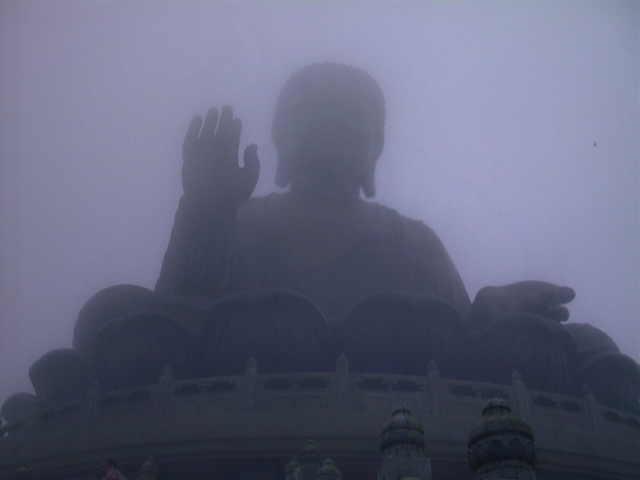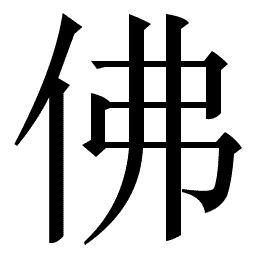From the sixth to the eighth
weeks after the Enlightenment the Buddha spent his time going back and
forth between the Bodhi Tree and the goat-herds' banyan tree. On the
fourteenth day of the waxing moon of the eighth lunar month, in the eighth
week after the Enlightenment, the Buddha took leave of the area of the
Enlightenment to make his way to the Deer Park at Benares, nowadays known as Sarnath,
in the vicinity of Varanasi. At that time the Group of Five who had once
followed the Buddha in his renunciation and lived with and tended him had
come to live at this place. On the way, specifically
when he reached the Gaya River on the border of the district in which he
had been Enlightened, the Buddha met a matted-hair ascetic by the
name of Upaka coming the opposite way. Upaka was was said to be an Ajivaka one of the kinds of
ascetics who were common in the Buddha's time and a

The Buddha goes to find the Group of Five
meeting Upaka the ascetic along the way.
As the Buddha drew nearer,
the ascetic asked him who his teacher was. When the
Buddha answered that he had no teacher, that he was a ayambhu, fully self-Enlightened,
the ascetic Upaka muttered: "It may be so, friend," shook his head and giving way
to the Blessed One, went on his journey.
Even though he did not evince complete acceptance of what the Buddha said, Upaka
appeared to have gone away with a certain amount of faith in the Buddha, as he came
back to the Buddha after some time. After leaving the Buddha on the road to Benares, he later got married to
Capa (Chawa), a hunter's daughter, and made his living selling the meat his father-in-law, the hunter, killed. Capa, who had aparently greatly admired Upaka as long as he had been an ascetic, began to dispise him for having been entrapped by HER and endlessly ridiculed him. Because of that, even though they had a son, he became weary of the household life and left, making his way to Savatthi, found the Buddha and entered the order. Practising the Buddha's teaching, he gained the stage of Once-returner, the Anagami.
Foreseeing this beneficial result which would
accrue out of his meeting with Upaka, the Blessed One continued on foot on his long
journey to Benares.
For additional insight and further clarification regarding the incident above where Upaka, even in the presence of the Buddha himself, is unable to discern the Great One's Enlightenment, please see: Dark Luminosity. See also The Honeyball Sutra wherein one Dandapani the Sakyan also, upon meeting with the Buddha, just walked away from him expressing doubt.
It is important to note carefully this event of Upaka's meeting with the Buddha. Here
was Upaka coming face to face with a truly Enlightened One, but he did not realize it.
Even when the Blessed One openly confessed that he was indeed a Buddha, Upaka
remained skeptical because he was holding fast to the wrong beliefs. In those days as well as today, there are people who follow wrong paths, refuse to
believe when they hear about the right method of practice. They show disrespect to
and talk disparagingly of those practising and teaching the right method. Such
misjudgments arising out of false impression or opinion should be carefully avoided. See Silabbata Paramasa, which is generally translated into meaning the adherence to wrongful belief, rites, rituals and ceremonies.
UPAKA'S WIFE:
The Therigatha Commentary supplies a favorable ending to the story of
Capa, Upaka's wife. She is said to have followed her husband to
Savatthi and likewise gone forth into the homeless life. She then outdid
her husband by becoming an Arahat. The Therigatha contains at least twenty verses attributed to her, some
taking the form of a dialogue with her husband. As for their son, Subhadda, the texts do not mention what became of him, but more than likely his care would have been entrusted to the Bhikkhunii Sangha.




